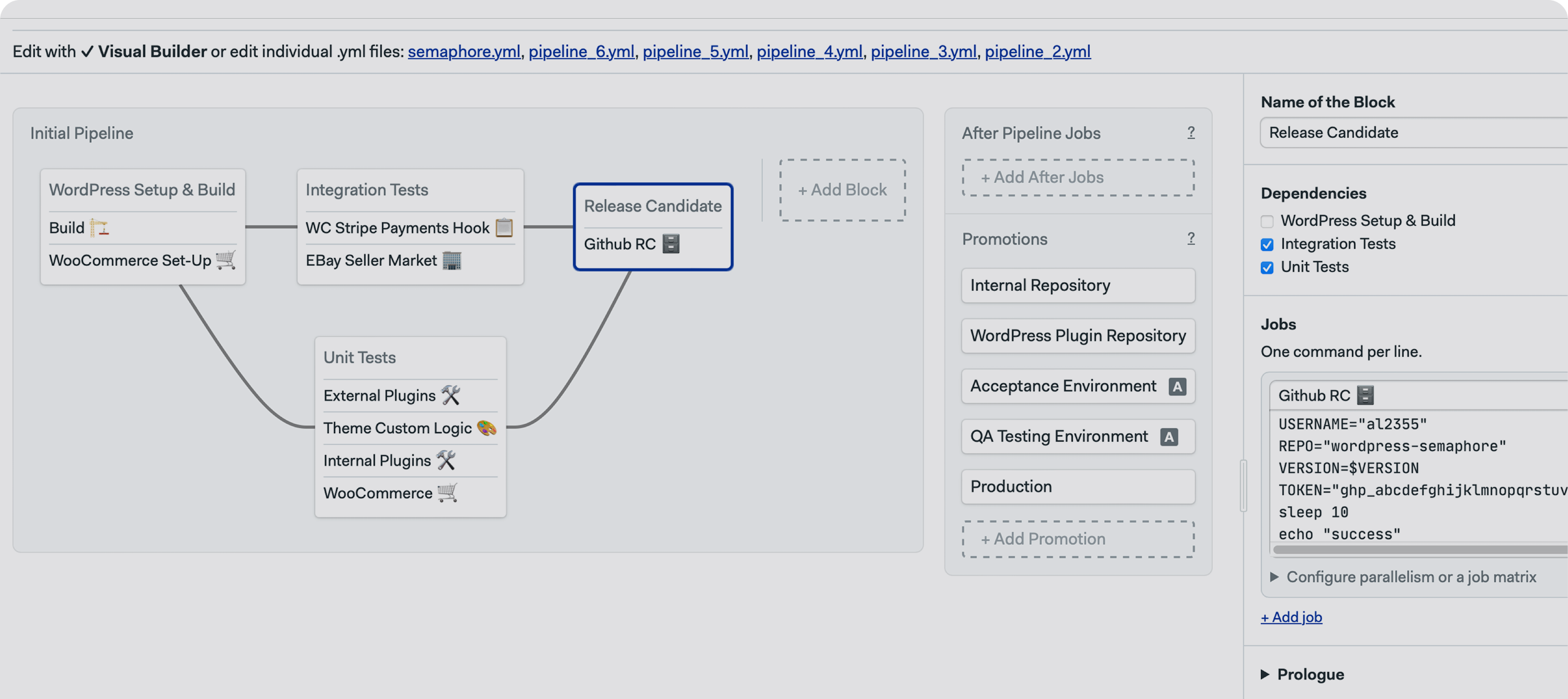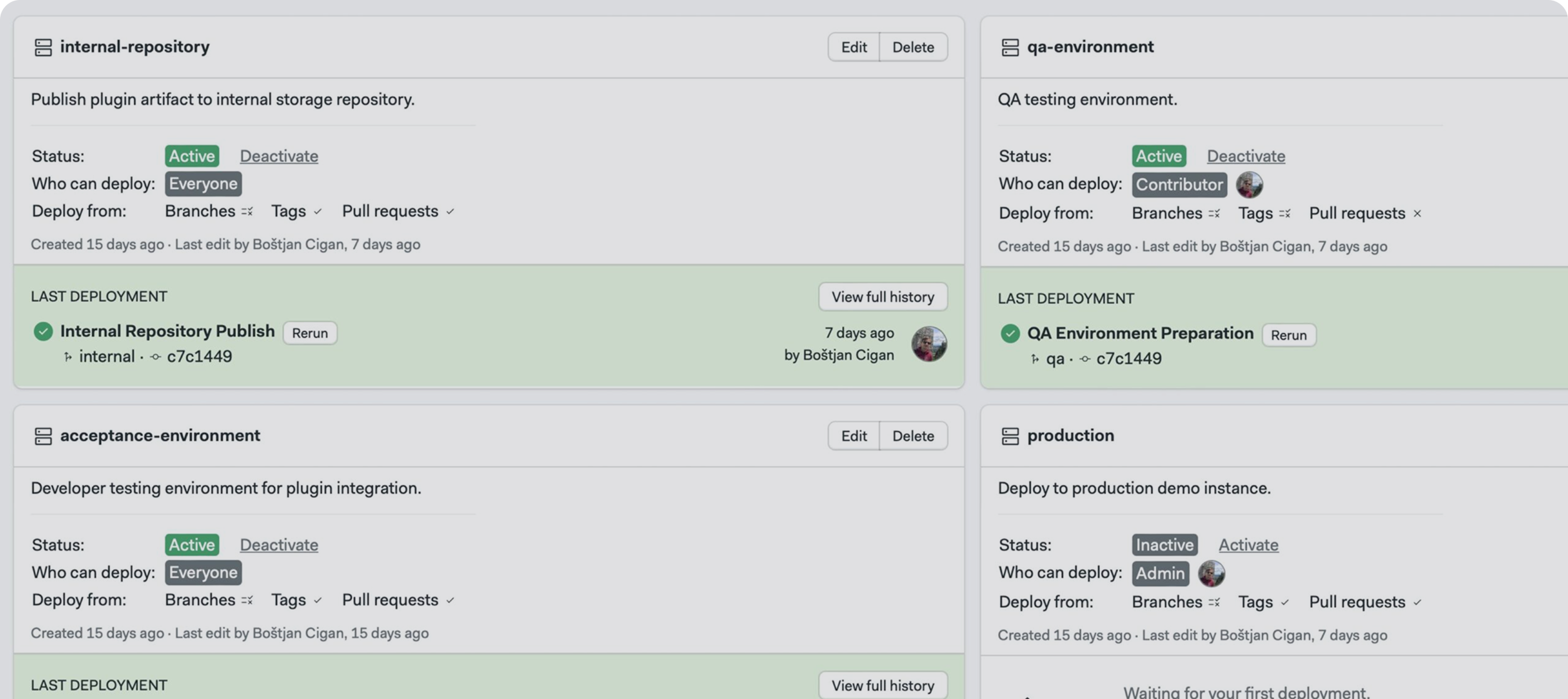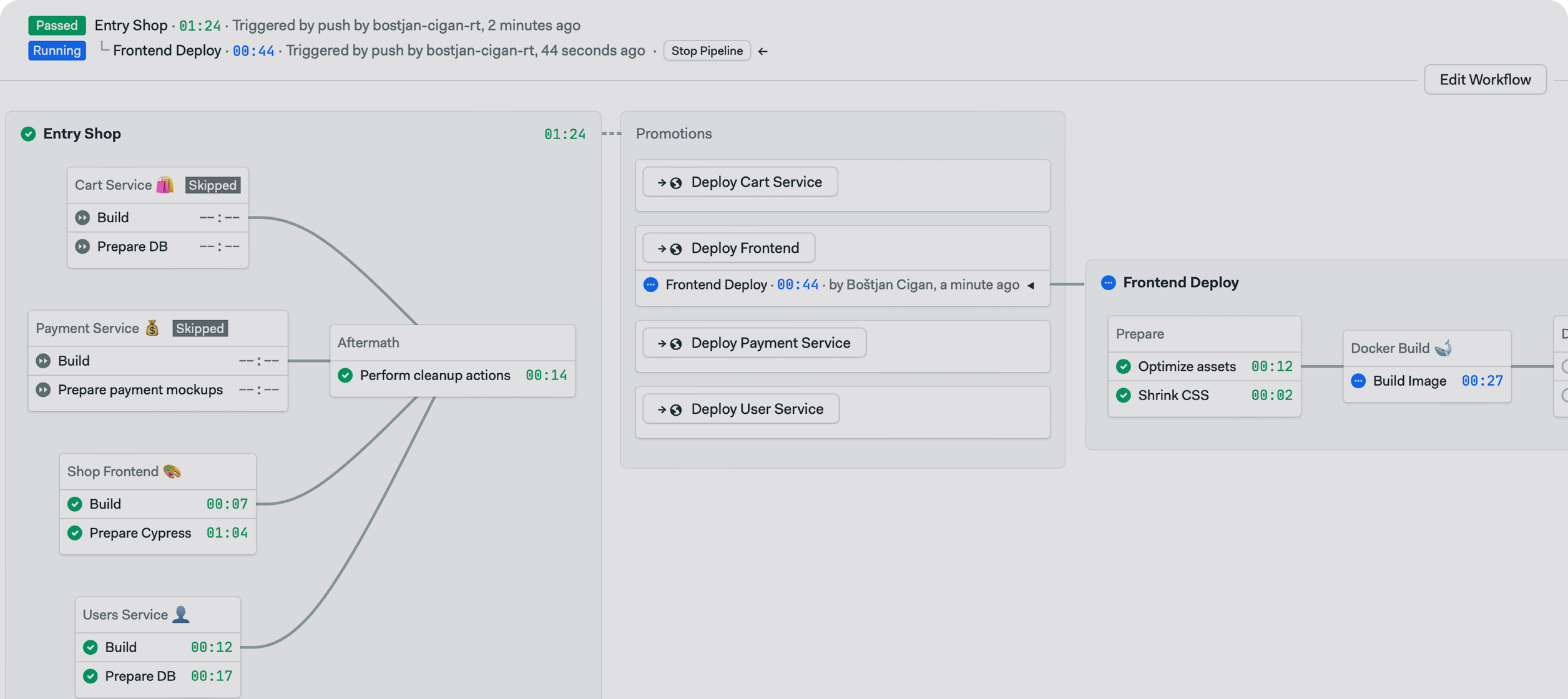All-in-one delivery platform for teams who’ve outgrown default tools
🏅 Proud Member of the Open Source Community
Semaphore is now a Silver Member of The Linux Foundation — a major milestone that reinforces our commitment to open standards, developer empowerment, and the future of open source.
Key Semaphore features for deployment
🧱 Visual Workflow Builder
- Design pipelines visually and auto-generate YAML.
- Onboard faster with visual performance feedback.
📈️️ Promotions
- Automate deployments to streamline updates in test environments.
- Control releases by adding approvals for critical stages.
🎯 Deployment Targets
- Secure deployments by controlling access and setting conditions.
- Simplified management to ensure compliance with ease.
📁 Monorepos Support
- Make builds smarter by triggering only relevant parts of your monorepo.
- Speed up workflows by minimizing build times with targeted updates.
These folks chose Semaphore
GoCo cut their continuous integration (CI) pipeline duration in half and reduced costs by 38% after migrating from CircleCI.
BetterUp runs their entire test suite in just 8 minutes with Semaphore.
“Semaphore is a great solution with an amazing support team that adapts to any need you have.“
We wanted one unified CI/CD system for the entire company—no more juggling tools across teams.
Semaphore is a super simple and cost-effective CI/CD tool.
Product Overview
Core Capabilities
– Visual Workflow Builder: No YAML required. Build CI/CD pipelines visually for faster onboarding and setup.
– Cloud-Native CI/CD: Fully managed SaaS that autoscales. Pay-as-you-go with instant feedback loops.
– Open Source Options: Use Semaphore as SaaS, hybrid self-hosted runners, or deploy the full Community Edition.
– Kubernetes + Multi-Cloud Ready: Designed for containers, Kubernetes, and multi-cloud deployments.
Key Features
– Monorepo Support: Natively supports large repositories. Incremental builds only rebuild changed components.
– Parallel Execution: Automatically parallelize jobs and scale pipelines for faster builds.
– Docker Native: Run builds in CI-optimized Docker images or your own custom containers.
– Language Agnostic: Supports all major languages, frameworks, and services with root-level access.
– Cost Savings: Migrating from legacy CI delivers up to 50% guaranteed savings.
Deployment Controls
– Staged Releases: Define pipelines with promotions, approval gates, and test/production workflows.
– Deployment Governance: Restrict deployments by environment, schedule, or team permissions.
Productivity & Insights
– Caching: Cache dependencies to reduce build time.
– CI Insights: Analytics for bottlenecks, team productivity, and pipeline performance.
– Testing Intelligence: Flaky test detection, aggregated test reports, and reliability dashboards.
– Access Control: Role-based access for teams and projects.
– Automation Interfaces: Full CLI + API for programmatic CI/CD management.
Self-Hosting Options
– Hybrid Execution: Self-host job runners to optimize costs.
– Community Edition: Fully self-hosted open source CI/CD platform for on-premise or cloud.
– Enterprise Licensing: Free Enterprise Edition for eligible companies.
FAQs
CI/CD stands for Continuous Integration and Continuous Delivery (or Deployment). It automates code integration, building, testing, and deployment—enabling faster release cycles, improved code quality, fewer human errors, and higher developer efficiency. Semaphore’s cloud-based CI/CD platform makes adopting these practices seamless, powering engineering teams at top tech companies to ship updates multiple times per day.
• Continuous Integration (CI): Developers frequently merge code into a shared repository, triggering automated builds and tests, with feedback ideally delivered in under 10 minutes.
• Continuous Delivery (CD): Extends CI by automating delivery to staging or production environments, typically requiring manual approval before release.
• Continuous Deployment: Goes one step further by automatically releasing every change to production without manual intervention.
A CI/CD pipeline—particularly a fast, reliable one like Semaphore—automates build, test, and deployment steps to deliver code at high velocity.
Key benefits include:
• Faster delivery and more frequent releases, sometimes multiple times per day.
• Higher code quality through early error detection and comprehensive testing.
• Reduced deployment risk, fewer mistakes, and greater efficiency.
Semaphore also provides autoscaling, pay-as-you-go pricing, native Docker support, and fast setup to minimize friction.
Semaphore follows proven best practices to maximize speed and stability, including:
• Using version control for traceability and smooth collaboration.
• Automating builds with Docker and caching mechanisms to accelerate pipelines.
• Running fast, fundamental tests first, while parallelizing workloads in clean, isolated environments.
• Leveraging autoscaling infrastructure and smart triggers to dynamically match demand.
Semaphore offers two editions:
• Semaphore Cloud, a fully managed service—no maintenance required.
• Semaphore Community Edition (CE), a free, open-source version you can self-host on Linux machines or Kubernetes clusters, with detailed installation and configuration guides provided.
• Semaphore Enterprise Edition (EE), commercial, fully-featured Semaphore instance that can be self-hosted on Linux machines or Kubernetes clusters. Meant for large companies who wish to host their CI/CD on-premise and require premium support.
Semaphore helps engineering teams ship software faster and with greater confidence. Unlike many CI/CD providers, Semaphore emphasizes:
• Speed (pipelines optimized to deliver results in minutes with parallelism and caching).
• Scalability (automatic machine scaling and flexible pay-as-you-go pricing).
• Flexibility (support for Docker, Kubernetes, and any programming language or framework)
• Simplicity (intuitive YAML configuration and seamless integration with GitHub, GitLab, or Bitbucket).
While all CI/CD tools automate builds, tests, and deployments, Semaphore’s focus on performance and developer productivity makes it a strong choice for teams that need both speed and reliability.
You can be up and running in minutes:
1. Sign up for a free Semaphore account.
2. Connect your Git repository.
3. Push an example pipeline.
4. Explore guided tours and sample projects in the Semaphore docs.
This frictionless setup—combined with autoscaling, Docker support, and intuitive workflows—lets teams adopt efficient CI/CD practices quickly.



